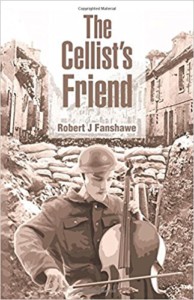 Title: The Cellist’s Friend
Title: The Cellist’s Friend
Author: Robert J. Fanshawe
Publisher: AuthorhouseUK
ISBN: 9781546288343
Pages: 200
Genre: Fiction / Historical
Reviewed by: Dan Macintosh
Pacific Book Review
Youthful self-discovery is usually extremely difficult, even in the best of circumstances. Transitional twilight between adolescence and adulthood can make even everyday life seem like a trial. The main character in Robert J. Fanshawe’s striking WWI novel The Cellist’s Friend is forced to enter adulthood surrounded by the horrors of warfare. While these complicated growth spurts are many times cumbersome – to say the least — Benjamin Routledge ultimately learns valuable life lessons from these experiences, rather than become bitter over them.
The book’s title refers to one of Routledge’s fellow soldiers, whom he calls Cello. He’s referred to as such because he is a talented cellist, and much more of a musician than a soldier. Early on, Routledge witnesses an incident involving Cello that causes him to seriously question the military’s integrity. In response, Routledge makes it one of his missions to be sure both the military and Cello’s family learn the harsh truth about this incident.
Another fellow soldier, nicknamed Midnight, saves Routledge’s life in battle. This event also triggers the genesis of another mission of sorts. When Routledge begins to exchange letters with Midnight’s widow, Pearl, he also finds himself falling in love with this exotic Jamaican beauty.
Routledge’s relationship with Pearl highlights one of the big social issues Fanshawe takes on with his novel, which is interracial relationships. Even before Routledge, who is white, realizes he’s falling in love with this young woman, he’s aware of the cultural disapproval of such a relationship. While recovering from a war injury in a military hospital, Routledge receives a letter from Pearl. And once his fellow soldiers learn she is a black woman from Jamaica, one soldier derisively refers to her as a ‘dirty darky.’
We learn early on how Routledge’s friend Cello loved both music and poetry. This refined view of art prompts Routledge to explore poetry. While recovering in a hospital, he spends many hours devouring poetry, as though it was a newly discovered favorite food. Later, once he gets to know Pearl better through their letter exchanges, he learns how she also is a lover of literature.
There is a distinct contrast between how the majority of Routledge’s fellow soldiers think and look at the world, and this newfound higher view he’s learned from Cello’s life, as well as his budding relationship Pearl. Sadly, he’s forced by circumstance to keep many of his personal discoveries away from his hospital mates. Much like children, many of these insecure roomies are just waiting for a reason to make fun of a fellow soldier’s behaviors. In addition to his bravery in battle, which he is officially recognized for, Routledge also exhibits a private bravery in swimming against the stream of his working-class culture.
Fanshawe does a fine job of getting us inside Routledge’s head. The reader feels as if he/she is traveling on this trail of self-discovery right along with Routledge. Fanshawe also succeeds in slowly revealing the novel’s plot in stages, which the reader peels away like onion layers. For example, rather than give the reader the complete picture of Cello’s incident at the outset, Fanshawe reveals new facts as the story progresses. This acts as a kind of hook, which keeps the reader intrigued and reading expectantly.
Although The Cellist’s Friend is set in WWI, it’s story and themes are timeless. The horrors of war have not subsided much since its early 20th century setting, and racial issues are as sadly topical now, as they were back then. With that said, though, the discovery of romantic love and the beauty found in art continue – at least for those with eyes to see and ears to hear. If Fanshawe’s character Routledge teaches us anything, it’s that the only way to find hope in the face of seeming hopelessness, is to focus one’s attention on true beauty. And once focused, pursue it.

